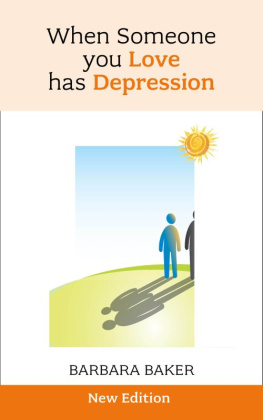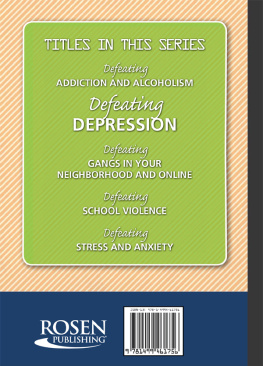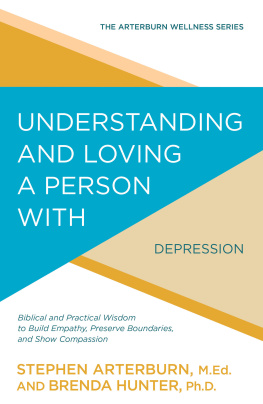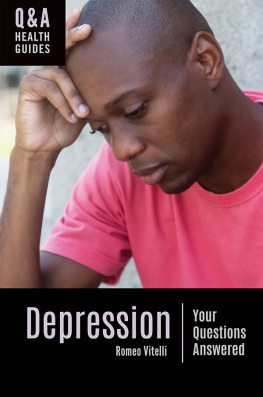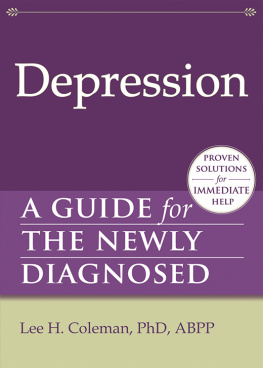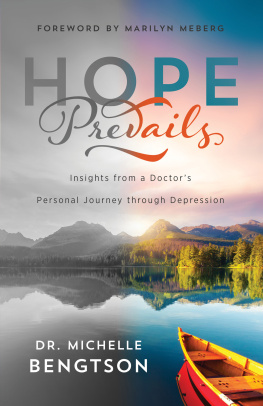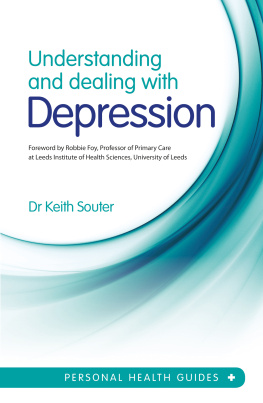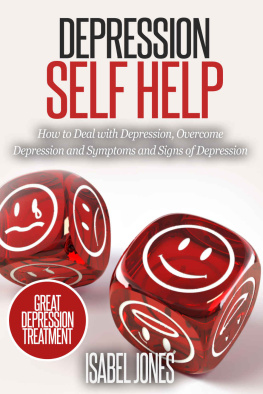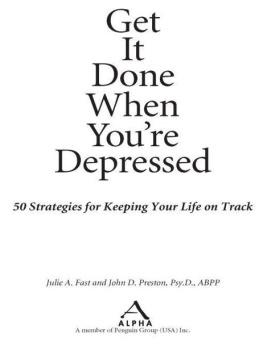Barbara Baker - When Someone You Love Has Depression
Here you can read online Barbara Baker - When Someone You Love Has Depression full text of the book (entire story) in english for free. Download pdf and epub, get meaning, cover and reviews about this ebook. year: 2013, publisher: John Murray Press, genre: Home and family. Description of the work, (preface) as well as reviews are available. Best literature library LitArk.com created for fans of good reading and offers a wide selection of genres:
Romance novel
Science fiction
Adventure
Detective
Science
History
Home and family
Prose
Art
Politics
Computer
Non-fiction
Religion
Business
Children
Humor
Choose a favorite category and find really read worthwhile books. Enjoy immersion in the world of imagination, feel the emotions of the characters or learn something new for yourself, make an fascinating discovery.
- Book:When Someone You Love Has Depression
- Author:
- Publisher:John Murray Press
- Genre:
- Year:2013
- Rating:3 / 5
- Favourites:Add to favourites
- Your mark:
- 60
- 1
- 2
- 3
- 4
- 5
When Someone You Love Has Depression: summary, description and annotation
We offer to read an annotation, description, summary or preface (depends on what the author of the book "When Someone You Love Has Depression" wrote himself). If you haven't found the necessary information about the book — write in the comments, we will try to find it.
When Someone You Love Has Depression — read online for free the complete book (whole text) full work
Below is the text of the book, divided by pages. System saving the place of the last page read, allows you to conveniently read the book "When Someone You Love Has Depression" online for free, without having to search again every time where you left off. Put a bookmark, and you can go to the page where you finished reading at any time.
Font size:
Interval:
Bookmark:
If someone you love has depression, and youre wondering how you can help, this handbook is written especially for you. Whether its a partner, child, parent, sister or brother, or a friend, whether hes been diagnosed or whether you suspect she has depression, family and friends can play a key role in supporting the person, and this book is designed to help. It will also be of use to anyone who has had depression themselves.
In the last few years, there has been an explosion of interest in depression. Its often in the news and many high-profile celebrities have told heartfelt stories about their own depression and how they cope. However, only about one-third of people who have depression are getting the right treatment, and depression is under-diagnosed and under-treated. The World Health Organization (WHO, see < Depression itself is sometimes regarded as untreatable, when in fact it is treatable. In addition, those who have depression may not seek the help they need.
The very nature of depression means that people with the condition often have a sense of hopelessness, lack of interest and lethargy, along with poor self-esteem and low confidence, and so may find it very difficult to seek treatment or to express how they feel, especially in the short time allotted for a doctors appointment. People with depression may not even recognize they have the illness. They might think no one, not even a doctor, can help. Or they might think theyll feel better without treatment. They might worry about having treatment, or the potential effect on their career if their workplace found out. They might feel too embarrassed to tell anyone, even their own partner or other family member. Despite its higher profile nowadays, its still common to feel that to admit depression is to admit defeat or weakness. All this can mean that someone who has the illness may not get the help he or she needs.
If you are a family member or friend of someone with depression, the WHO says that the role of the family in looking after a depressed person cannot be overemphasized. You are in a key position to help, and may be able to make the vital difference between the person you love getting a diagnosis and treatment, or not. Your role is potentially invaluable because:
you may have more time, energy and motivation than the person to inform yourself about what depression is and information is a key tool in battling depression;
you are often more likely to spot the symptoms of depression than the person himself. In fact, you might be the only one to spot the signs of depression at an early stage and be crucial in helping him get a proper diagnosis;
you are in a key position to help the person to get the treatment he needs;
you can support him during his treatment;
you are well placed to help him during his recovery, and support him back to normal life and his previous activities;
you can help him get all the information he needs, including steps to prevent the depression recurring.
Of course, no one can take responsibility for someone elses illness or well-being, nor should it be expected of you, no matter how close you are or how much you love the person you want to help. And you shouldnt expect it of yourself, despite your likely sense of responsibility and perhaps guilt. Its important that you dont blame yourself if recovery is slow or problematic, or the person wont or cant listen to you or accept your help.
But there are many positive steps you can take. This handbook offers an action plan. It will:
give you the factual information you need about depression. As explained above, recognizing symptoms is particularly important as the person herself (and some doctors) may not always recognize depression;
tell you about the treatments available;
explain how to get help for the person who has depression;
suggest ways to help someone recover;
inform you about how to help prevent recurrent depression;
tell you about mindfulness-based cognitive therapy, a valuable new technique for helping avoid the recurrence of depression;
suggest ways you can keep yourself healthy and well. This is vital if you run out of steam, you wont be able to help anyone else.
Caring about someone who has depression is often a difficult and thankless task, with no quick fixes. The day-to-day reality of staying strong while someone else is at rock bottom and sometimes appearing to be beyond help is gruelling. I very much hope this book will help show you that there is a way through, and that even when the depressed person cant express appreciation of it, your support is extremely valuable.
Everyone feels sad from time to time. When something upsetting happens, or we go through a bad patch, its normal to experience a reaction and feel down. Our moods can also be influenced by hormone imbalances, physical illness, tiredness or stress. So we might say, Im depressed, when really we mean were fed up or angry, run down or sad. Thankfully, for most of us, most of the time, the good days outnumber the bad and we get through the down times and are able to carry on with our lives again. But depression is very different.
Depression is an illness and is one of the most common reasons for consulting a doctor. Sometimes called depressive disorder or clinical depression, it refers to a range of symptoms, characterized first by persistent low mood and second by loss of interest in ordinary things and experiences that the person previously enjoyed, together with a range of other emotional, cognitive, physical and behavioural symptoms. These can include tiredness, feelings of hopelessness, anxiety, negative thoughts, despair, low self-esteem, poor concentration and memory, tearfulness, feelings of inadequacy, forgetfulness, poor motivation, low energy, reduced self-care in terms of personal hygiene and appearance, inactivity, changes in appetite, loss of sex drive, worrying about ones health more than usual, close-down of social life, a range of physical symptoms like aches and pains, sleep problems and thoughts of death or suicide.
Overall, depression occurs in one in six people in the UK; No two peoples experience of depression is exactly the same, but there are usually common features. Whatever form it takes, it is an extremely isolating, daunting and debilitating experience. Depression can vary in severity from mild to severe, and greatly interfere with someones ability to function, affecting family relationships, working life and social life. People who have severe depression may harm themselves or have thoughts of suicide. Rarely, they may have hallucinations or delusions. Depression is sometimes, but not always, accompanied by anxiety. People may have just one episode of depression in their lifetime, though around half of people who have an episode of depression have further episodes later on.
Depression used to be thought of as lasting on average for four to six months, with complete recovery after that. Now its known that symptoms can last for a year or more the World Health Organization found that 60 per cent of people have depression a year after diagnosis, and 10 per cent have persistent or chronic depression. About 50 per cent, after a first episode of major depression, go on to have at least one more episode, and after the second episode the risk of a further relapse rises to 70 per cent and after a third episode rises to 90 per cent.
Having depression is not the same as being lazy or weak. It is a medical disorder, and it can be treated. And there are many steps someone who has depression can take to help herself and to prevent recurrence.
Whatever the facts and figures, when you love someone who has depression, it can be a frightening, draining and frustrating experience. The heartache of seeing someone you care for enduring such a distressing time may be compounded by feeling at a loss as to how best to help. Understanding more about the nature of depression can arm you with the knowledge you need about ways to offer support and assistance. The good news is that most people recover from depression for some it can even be a catalyst for positive change and growth.
Font size:
Interval:
Bookmark:
Similar books «When Someone You Love Has Depression»
Look at similar books to When Someone You Love Has Depression. We have selected literature similar in name and meaning in the hope of providing readers with more options to find new, interesting, not yet read works.
Discussion, reviews of the book When Someone You Love Has Depression and just readers' own opinions. Leave your comments, write what you think about the work, its meaning or the main characters. Specify what exactly you liked and what you didn't like, and why you think so.

